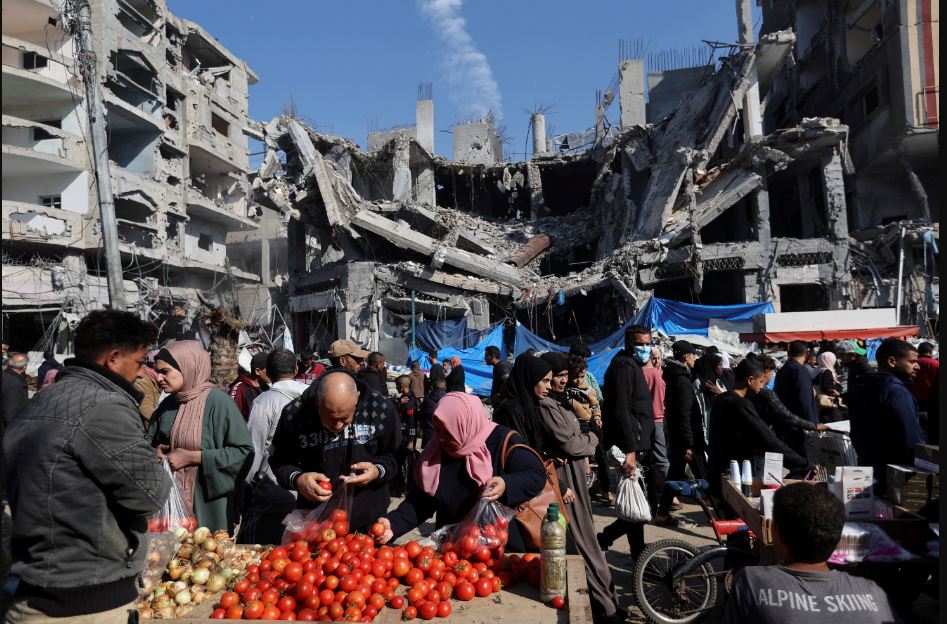Iraq protests enter second month, defying pledges of reform
Baghdad (AFP) — Iraq’s top cleric warned foreign actors on Friday against interfering in his country’s anti-government protests as they entered their second month despite pledges of reform and violence that has left over 250 dead.
The demonstrations have evolved since October 1 from rage over corruption and unemployment to demands for a total government overhaul — shunning both politicians and religious figures along the way.
They have even condemned the influence of paramilitary forces including the Hashed al-Shaabi, whose members descended briefly into the streets of the capital late Thursday in a show of force, sparking fears of a confrontation with the main protests.
In his weekly sermon, the country’s top Shiite religious authority Grand Ayatollah Ali al-Sistani said Iraq must not be dragged “into the “abyss of infighting”.
“No person or group, no side with a particular view, no regional or international actor may seize the will of the Iraqi people and impose its will on them,” said Sistani’s sermon, read by a representative.
Sistani’s comments, which can usually make or break a government decision in Iraq, came a day after comments by Iran’s supreme leader Ayatollah Ali Khamenei.
“I seize this opportunity to tell those who care about Iraq and Lebanon to remedy insecurity as their priority,” Khamenei said, without elaborating.
Iraq has close but complicated ties with both Iran, its large eastern neighbour, and the United States, which opposes Tehran’s influence in the region.
Since mass protests broke out in Iraq, demonstrators and their detractors have accused each other of being backed by outside actors.
More than 250 people have died and 10,000 have been wounded in the past month as protests evolved into calls for the “downfall of the regime”.
The movement is unique in Iraqi history because of its condemnation of the political and religious class wholesale.
“No one represents the people, not Iran, not the parties, not the clerics. We want to take back our country,” said Ali Ghazi, 55, protesting in Baghdad on Thursday.
“You’re all thieves. From 2003 until now, what have you done?” he said, referring to the year a US-led invasion toppled dictator Saddam Hussein.
Since then, Iraq’s political system has been gripped by clientelism, corruption and sectarianism.
One in five Iraqis live below the poverty line and youth unemployment stands at 25 percent, despite the vast oil wealth of OPEC’s second-largest crude producer.
That inequality has been a rallying cry for the protests, unfazed by the goverment’s proposals of hiring drives and increased social welfare plans.
On Thursday night, President Barham Saleh vowed to hold early elections once a new voting law and electoral commission has been agreed.
He also said embattled Prime Minister Adel Abdel Mahdi was ready to step down once another candidate was found.
Abdel Mahdi, 77, came to power a year ago through a tenuous partnership between populist cleric Moqtada Sadr and paramilitary leader Hadi al-Ameri.
The kingmakers’ alliance has frayed in recent months, as Sadr threw his weight behind the protests while Ameri and his allies backed the government.
A rapprochement built on Abdel Mahdi’s ouster appeared close this week, but disagreements over a replacement and pressure by Iran seem to have caused a stalemate.
An Iraqi government official said that following Khamenei’s tweets, “Ameri did a total 180.”
Sadr, too, has previously called on his own paramilitary fighters to be on “high alert” and to “protect” protesters if need be.
Fanar Haddad, an expert at Singapore University’s Middle East Institute, said the political class appeared not to see that the protests presented “the most serious challenge to the post-2003 order”.
“Promises of new election laws, or the formation of constitutional reform committees and so forth fall on deaf ears,” he told AFP.
“They are seen as smokescreens with which the political classes are trying to save themselves and preserve their privileges,” Fanar added.
The demonstrations are the bloodiest popular movement in Iraq in decades, with medics and doctors reporting unusually high rates of trauma wounds from tear gas grenades.
On Thursday, Amnesty International revealed that Iraqi forces were using military-grade tear gas canisters in an “unprecedented” way, shooting them directly at protesters.
The grenades have “pierced” protesters’ heads or chest, causing at least five deaths, it said.



